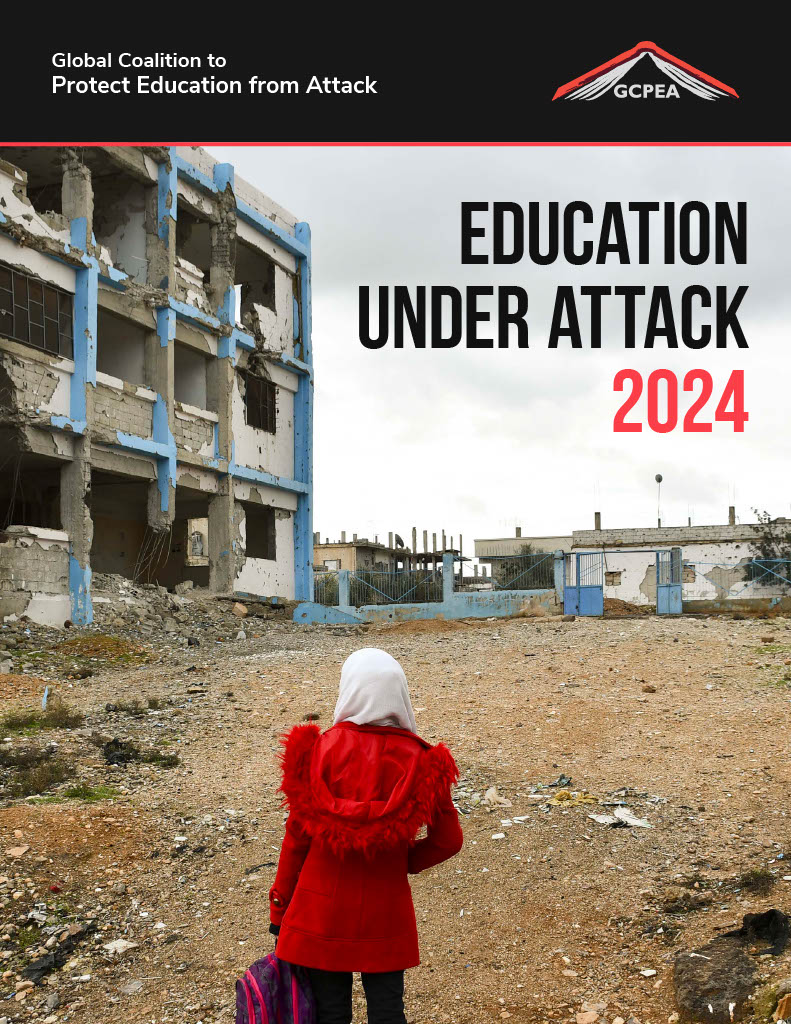GCPEA News
Gender-Based Attacks on Education in Armed Conflict
Inter-agency Network for Education in Emergencies (INEE), July 17, 2024
Published by Global Coalition to Protection Education from Attack (GCPEA), Inter-agency Network for Education in Emergencies (INEE)
Written by Alexander Kochenburger
Published 16 JULY 2024
Topic(s): Attacks on Education, Gender Based Violence, Gender
In 2022-2023, the Global Coalition to Protect Education from Attack (GCPEA) collected examples of gender-based attacks on education in armed conflict including the abduction of girls on their way to school in Yemen, the use of improvised explosive devices on a girls’ middle school in Pakistan, the raiding of women’s university dormitories in Sudan, and numerous examples of acts of sexual violence against girls on the way to school in Cameroon, South Sudan, and beyond.

GCPEA’s latest report, Education under Attack 2024, found that young women and girls were targeted because of their gender in attacks on education in at least ten countries. This is a terrible continuation of this pattern, as GCPEA reported gender-based attacks on education in 11 countries in 2020-2021. In some contexts, such as Afghanistan, these attacks occur in opposition to girls’ education, while in others they are situated within a wider backdrop of conflict-related sexual violence. In all cases, these attacks set in motion a devastating chain of events for young women and girls.
There are effective policies in place for states and the international community to mitigate and respond to gender-based attacks on education in armed conflict. When governments endorse and implement the Safe Schools Declaration (SSD), an international political commitment to protect education during war, there are guidelines to do so in a gender-responsive manner. These include preventative measures such as reviewing curricula to ensure that education does not contribute to conflict and gender-based stereotypes and collecting gender-disaggregated data to understand the scope and scale of the problem. Recommended responses include immediate measures such as ensuring survivors of gender-based violence have support to continue their education and longer-term measures such as access to the justice system to pursue accountability. During a past United Nations Security Council Open Debate on Women, Peace and Security (WPS), many states highlighted the transformative potential for the SSD to protect education for young women and girls in armed conflict.
GCPEA, along with many other organizations, has previously documented that when young women and girls are targeted by attacks on education, they not only face greater obstacles returning to their education, but suffer from increased rates of forced marriage and early pregnancy, further contributing to both economic and social exclusion which ingrain gender inequality. With armed conflicts in 2023 having been recorded at the highest level in decades, now is the time for remaining states to endorse the SSD and for all states to implement the declaration and other education and child-protection efforts in a gender-responsive manner.
GCPEA is committed to gender equity, and as it moves into its 2025-2027 strategic plan, is looking for opportunities to collaborate on advocacy for conflict-affected women and girls. How can GCPEA’s data and advocacy support your organization’s gender equity work? Please reach out to us at gcpea@protectingeducation.org
————–
Alexander Kochenburger is a coordinator at the Global Coalition to Protect Education from Attack (GCPEA). He supports GCPEA’s programmatic work, including through assisting the Coalition’s advocacy and research efforts as well as managing its communications and finances. Previously Alex worked at the New Lines Institute for Strategy and Policy as an analysis supervisor and at AMIDEAST as a senior program assistant. He also completed a Fulbright grant in Agadir, Morocco from 2017-2018. Alex obtained a Master of Arts in Law and Diplomacy from The Fletcher School at Tufts University and a Bachelor of Arts in International Studies and Arabic from the College of the Holy Cross. He has an advanced proficiency in Arabic.




